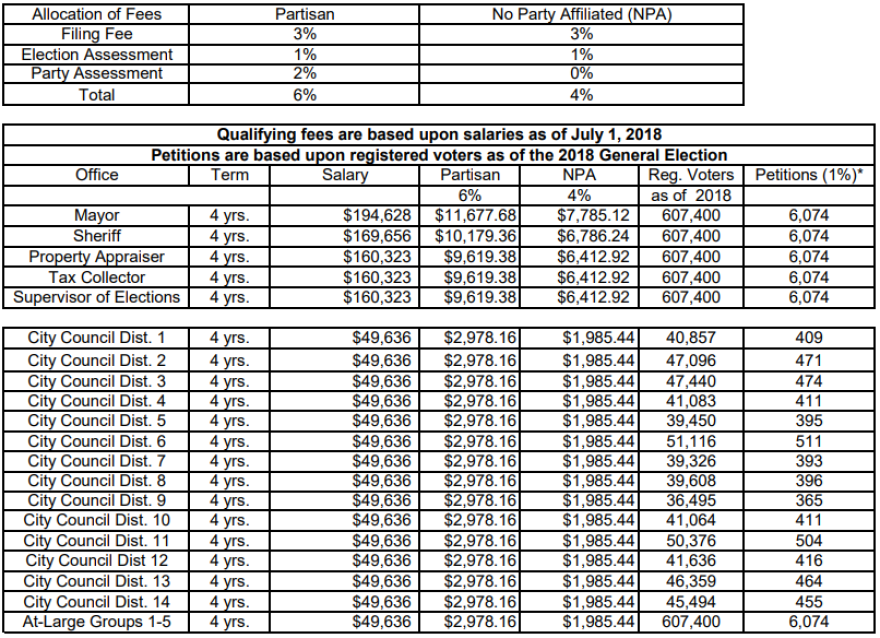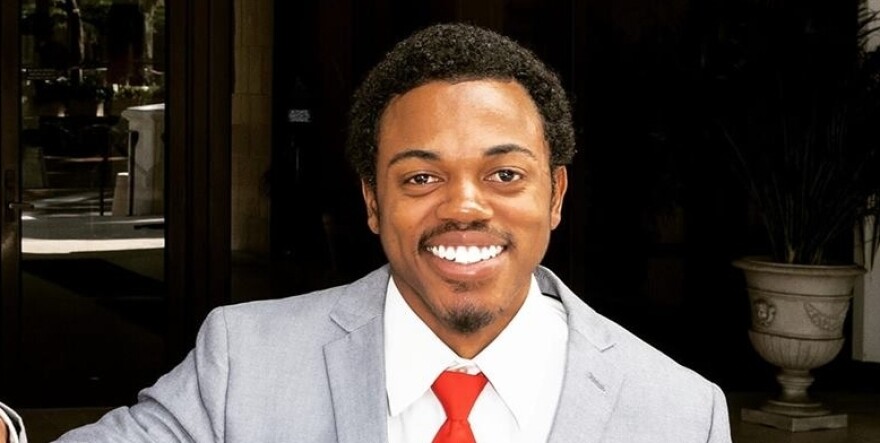Update: Connell Crooms switched his campaign plans after this story's publication. He is running for a At Large Group 1 City Council seat.
Mayoral, constitutional and city council candidates have many hoops to jump through in order to qualify for candidacy and a big deadline is fast approaching.
In order to qualify, those candidates are required to either pay a qualifying fee or submit signed petitions. Completed and signed petitions are due at the Duval County Supervisor of Elections office before noon on Monday, December 10.
The number of signatures required is based on the number of registered voters from the latest election in the district where the candidate is running. “So we took the book closing numbers for the 2018 general election for each city council district and then also for the county for the constitutional officers,” said Lana Self, Candidate Services Director for Duval County. “The number is 1 percent of those registered voters.”

Duval County had 607,400 registered voters at the time of the 2018 midterm election in November. That means mayoral and constitutional candidates (sheriff, property appraiser, tax collector, at-large city council members and supervisor of elections) need to get 6,074 signatures in order to qualify.
Related: List Of Candidates That Have Filed For The 2019 City Election
Self said candidates can start collecting those signatures as soon as they file the required paperwork, appoint a campaign treasurer and designate a depository with the elections office.
Instead of collecting petition signatures, candidates can also opt to file a qualifying fee. The amount of that fee is based on the authorized salary for the position as of July 1 of the preceding year. Salaries are determined by the state and are based on population.

Qualifying fees for candidates associated with a political party are 6 percent of the annual salary of the office that candidate is seeking. The fee is 4 percent of the salary for candidates with no party affiliation (NPA). The extra 2 percent partisan candidates pay goes to the state party they are associated with. Qualifying fees are drawn from the candidates campaign account.
Connel Crooms, 28, is running for Jacksonville mayor. He’s opting to pay the filing fee rather than collect petition signatures. He felt trying to collect thousands of signatures would have been a waste of time so he decided to focus on “strategizing and developing a platform that people will vote for and fundraising on that.”
Crooms said it’s been challenging, but he’s already raised more than $6,000. As a NPA candidate, he’s required to pay a qualifying fee of $7,785.12 in order to run for mayor.
Crooms is an activist who became known to Jacksonville residents after he and others protesting U.S. airstrikes in Syria were arrested in Hemming Park last year.
Crooms was hospitalized after the incident and accused the Jacksonville Sheriff’s Office of police brutality.
“I know a lot of the Jacksonville establishment originally took this campaign as a joke because of my age,” said Crooms. “But they forget that I do have a lot of knowledge, I’ve been very involved with the Jacksonville political process, movements and activism and all that stuff. I’ve got that education. But I don’t have the advantage of being an incumbent, and they have that advantage. You’ve got to recognize that you’re just going to have to outwork the incumbent, so that’s where we’re at.”
Crooms said the Duval County Elections Office has been very accommodating, but there have been a lot of unnecessary challenges mandated by the state in the filing process. “They systematically set things up to where if you don’t have the community support in a mass way behind you then getting on the ballot is going to be a struggle already,” Crooms said.
“But we live in a unique time where we have tools like social media,” he went on to say. “People have to remember that Obama and Andrew Gillum and Bernie Sanders all won by really raising money outside of the political establishment... So it is doable... but there are roadblocks that are involved.”
One example he gave: the deluge of forms and reports that have to be filed. In a small grassroots campaign like Crooms is running, the candidates may have to do pretty much all of the reporting and infrastructure work by themselves. “A lot of these big campaigns, what they do, they just contract out their work. They don’t really do any grassroots campaigning,” he said. “So this is different, we’re actually doing the work.”
“I had a binder full of all the laws that I had to follow,” Crooms said. “That’s a lot of stuff that you have to go through and I’m just happy, and maybe fortunate, to have people who have expertise in those areas on my team and doing it on a volunteer basis.”
As a deaf man, Crooms has had to face a unique set of challenges in his campaign. “So many people miss out on hearing from people who are marginalized, just from communication barriers,” he said. “So once we get past the communication barriers people really start to open up and you really get to see, ‘can you make a difference?’ And you realize that you can, you just really have to do it yourself. You have to put in the groundwork and trust the work that you’ve done in the past.”
Bottom line, said Crooms: “We just need fair and free elections right now. We need to take a look at our whole elections process, because everything can be better. There’s room for improvement for the voting process in Florida.”
The qualifying period for unitary elections runs from January 7 to January 11. That’s when candidates who have filed paperwork with the elections office, opened a campaign account and collected petitions or are raising money are required to submit additional paperwork and forms. “That paperwork includes a candidate oath, a financial disclosure form and their check for the qualifying fee if they did not submit the required number of petitions,” said Self.
The first election will be held on March 19, 2019. Candidates who get a majority of the votes cast in their contest during that election will be declared the winner. Other races will proceed to the general election on May 14, where the two candidates who had the highest vote totals in the first election will face each other again.
Brendan Rivers can be reached at brivers@wjct.org, 904-358-6396 or on Twitter at @BrendanRivers.






